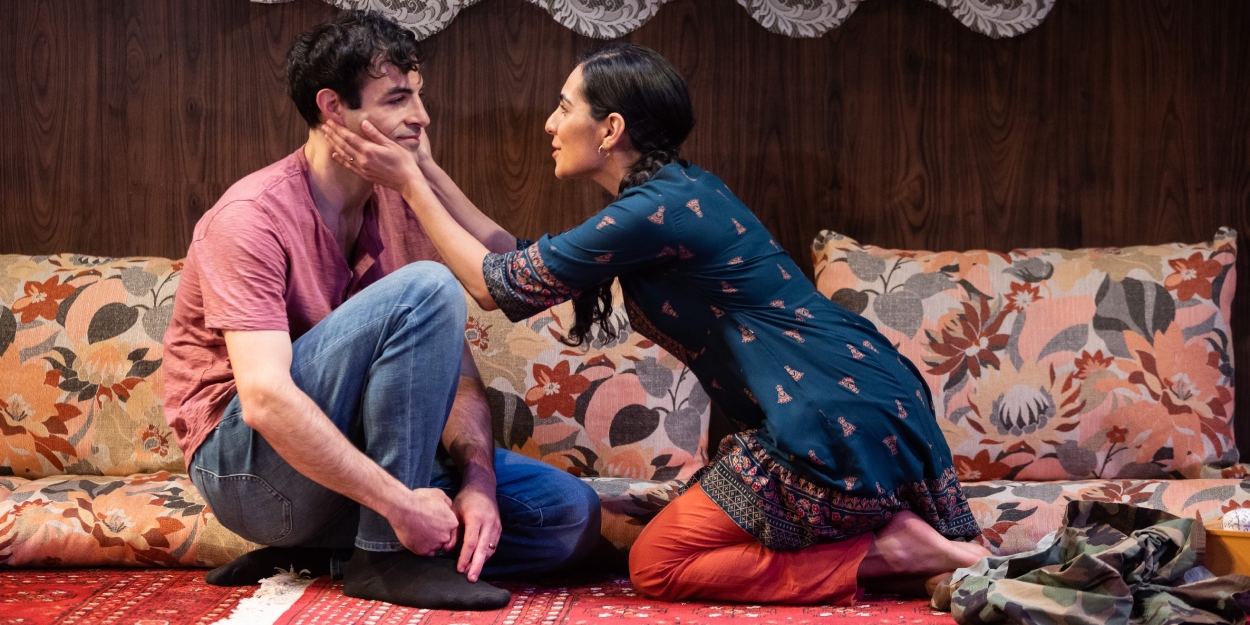Review: SELLING KABUL at Signature Theatre
Selling Kabul runs at Signature Theatre through April 2nd.

American involvement in - and the subsequent withdrawal from - Afghanistan has been a point of contention for over two decades. The disastrous withdrawal in 2021 and the collapse of the Afghan government has been devastating, but Americans have been able to step away from their disappointment and grief in a way that those left behind have not. This is only the latest in a series of failures Afghans have experienced, and the consequences of poor decisions and follow-through on our end have left real, drastic effects for many people.
Throughout Operation Enduring Freedom, the United States relied heavily on local Afghans as translators, fixers, consultants, security, and much more. Afghans who served as contractors for the US risked being labeled as watan faroosh (traitors) and faced social pressures as well as threats of extortion, kidnapping, and death. With stakes this high, the US passed the Afghan Allies Protection Act of 2009, which created the Special Immigrant Visa program for Afghans who were employed by or on behalf of the American government. However, the SIV process was slow, overly complicated, difficult to navigate, and costly, and many Afghans waited months or even years only to have their applications denied without explanation. Within the US, political reasons (the need for on-the-ground staff, anti-immigrant sentiments, etc.) often delayed or altogether hampered the process, and the system wasn't expedited to accommodate the 2021 departure, leaving many eligible Afghans behind.
%20and%20Neagheen%20Homaifar%20(Leyla)%20in%20Selling%20Kabul%20at%20Signature%20Theatre_%20Photo%20by%20Christopher%20Mueller.jpg)
Selling Kabul aims to put a human face and family at the center of this complex geopolitical and military issue, taking the abstract hurts and stripping them down to show us the human toll behind them. Sylvia Khoury's play focuses on Taroon, an Afghan who served as a translator for the Americans who is hiding in his sister and brother-in-law's home while he waits for word on his visa application. The Taliban, who employs his brother-in-law, Jawid, has been searching for him, and has even targeted his pregnant wife in their quest to root him out, and the Americans have been radio silent - an issue exasperated by the failing internet router. While his sister, Afiya, attempts to hide Taroon and care for his wife and their future child, circumstances spiral out of control and bring danger directly to their doorstep.
Part of what makes Khoury's script so powerful is the universality of her characters. Taroon and Afiya interact as any set of siblings would, alternating between affection and bickering, celebrating one moment and threatening to stab each other in the next. The easy relationship makes them feel incredibly relatable, even within their unique situation. Likewise, Afiya and Jawid's struggles with infertility and their neighbor Leyla's conflict with her mother-in-law and challenges as a new mother are all elements that could exist at any point in time, anywhere in the world. That backdrop of normalcy is what makes the extraordinary circumstances feel all the more disconcerting. Even the more specific elements, such as the decision whether to stay in Afghanistan or try to leave the country, hit on experiences that are heartbreakingly relatable - I saw this show with a friend who noted this mirrored her own family's experiences fleeing Iran, and those who've left the Soviet Union, the Balkans, Central America, Syria, Yemen, and Ukraine can certainly see their own journeys as well.
This powerful script wouldn't have nearly as strong of an impact if it weren't also for the solid creative and production team at Signature. Director Shadi Ghaheri brings a thoughtful approach to the performance, keenly aware of its importance without ever allowing it to veer into contrived emotionality or conceit. Mazin Akar's Taroon is brash and rails against his isolation, but also reveals a deep well of honor and love. But it's the heartbreaking hope for support from his American colleagues, and his outstanding grief when he sees the Taliban's cruel use of his actions as weapons against loved ones that truly tug at the audience's heart and conscience and show Akar's incredible range. Likewise, Yousof Sultani brings a complex and fascinating range to Jawid, showing the layers of a man who is protecting his wife and family, but worries about the cost of some comfort and that safety. His guilt and determination make for a captivating character portrayal. As Leyla, Afiya's neighbor and friend, Neagheen Homaifar embodies the varying levels of loss that come from living in a society forced to turn on one another - the evolution of her character as the situation spirals is entrancing and heartrending, and Homaifar deftly carries the difficulties of the role with an earnest and believable ease. At the center of the tale is Awesta Zarif's Afiya, the sister determined to make the best of her circumstances while also working to protect all of those around her from the Taliban's cruel games. Zarif carries Afiya's drive, passion, and strain perfectly, showing the woman's complexity and burden in every movement, and continuously keeping the audience's eye. While the story is centered around Taroon's circumstances, it's Zarif who seems to be the center of gravity for the plot and performance - she's the one making decisions and contingencies, evaluating the direness of the situation and working to ensure everyone comes through, even at her own expense, and the moments when she allows her own grief to show through that grit are the moments when you realize how much better the world would be with more people like her.
%20and%20Awesta%20Zarif%20(Afiya)%20in%20Selling%20Kabul%20at%20Signature%20Theatre_%20Photo%20by%20Christopher%20Mueller.jpg)
Behind the scenes is an equally formidable production team. With solid lighting (John D. Alexander) and sound (Matt Otto), it's Signature's incredible scenic design that elevates the show to a thing of beauty - Tony Cisek's set captures the feel of Afiya and Jawid's home - and how cramped it can feel when confined to it - and features clever storage spaces, inviting cushions, and a functional kitchen (or at least a sink and fridge). That attention to detail carries over to Casey Kaleba's meticulous fight choreography, and is clearly informed by the work of Cultural Advisor Humaira Ghilzai, who also serves as Dramaturg for this production. Ghilzai helps set a believable tone for this space and family, and the elements that fill out daily life in Afghanistan are clearly and seamlessly incorporated. Moyenda Kulemeka's attractive and carefully selected costumes are equally vital to this sense of place, and each piece highlights the characters' roles and personalities.
Covering a topic as fraught as the US involvement in Afghanistan can be difficult and deeply painful, but Signature's production of Selling Kabul manages to be honest, unflinching, and compassionate without losing sight of who matters in its tale. It's not the easiest show to watch, especially as we still grapple with our own role in the tragedy that this family is living, but it's beautifully portrayed, and incredibly important.
Selling Kabul runs at Signature Theatre through April 2nd, and is part of the SigWorks: The Heidi Thomas Writers' Initiative. Content warnings for discussions of violence, infertility, and armed conflict. Signature does not allow children under the age of six, and recommends this production for mature teens and adults. Additional information on masking policies, discussions, and affinity nights can be found on the Signature website. Run time is approximately 1 hour and 45 minutes with no intermission.
Photo Credit: Christopher Mueller
Reader Reviews

Videos
